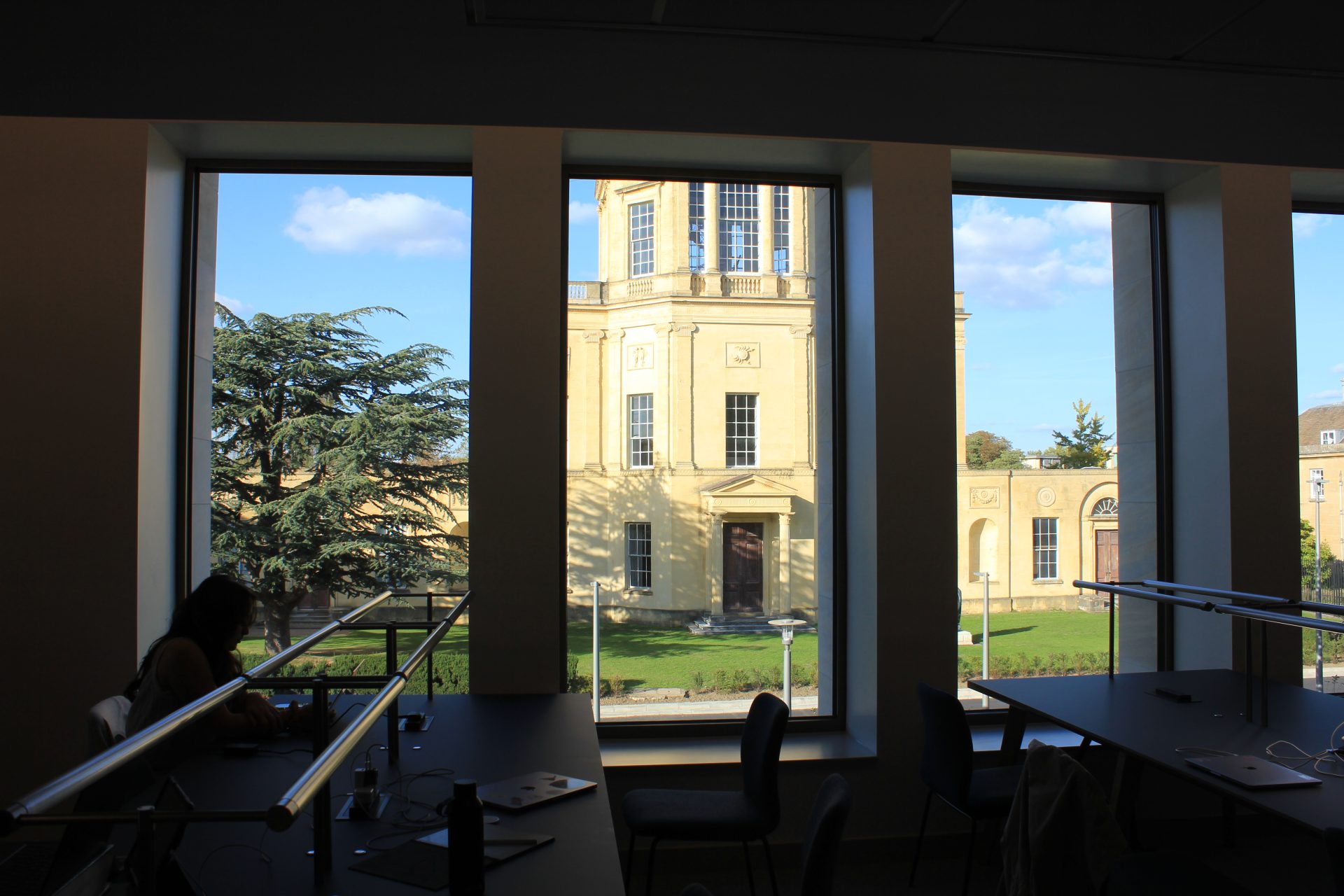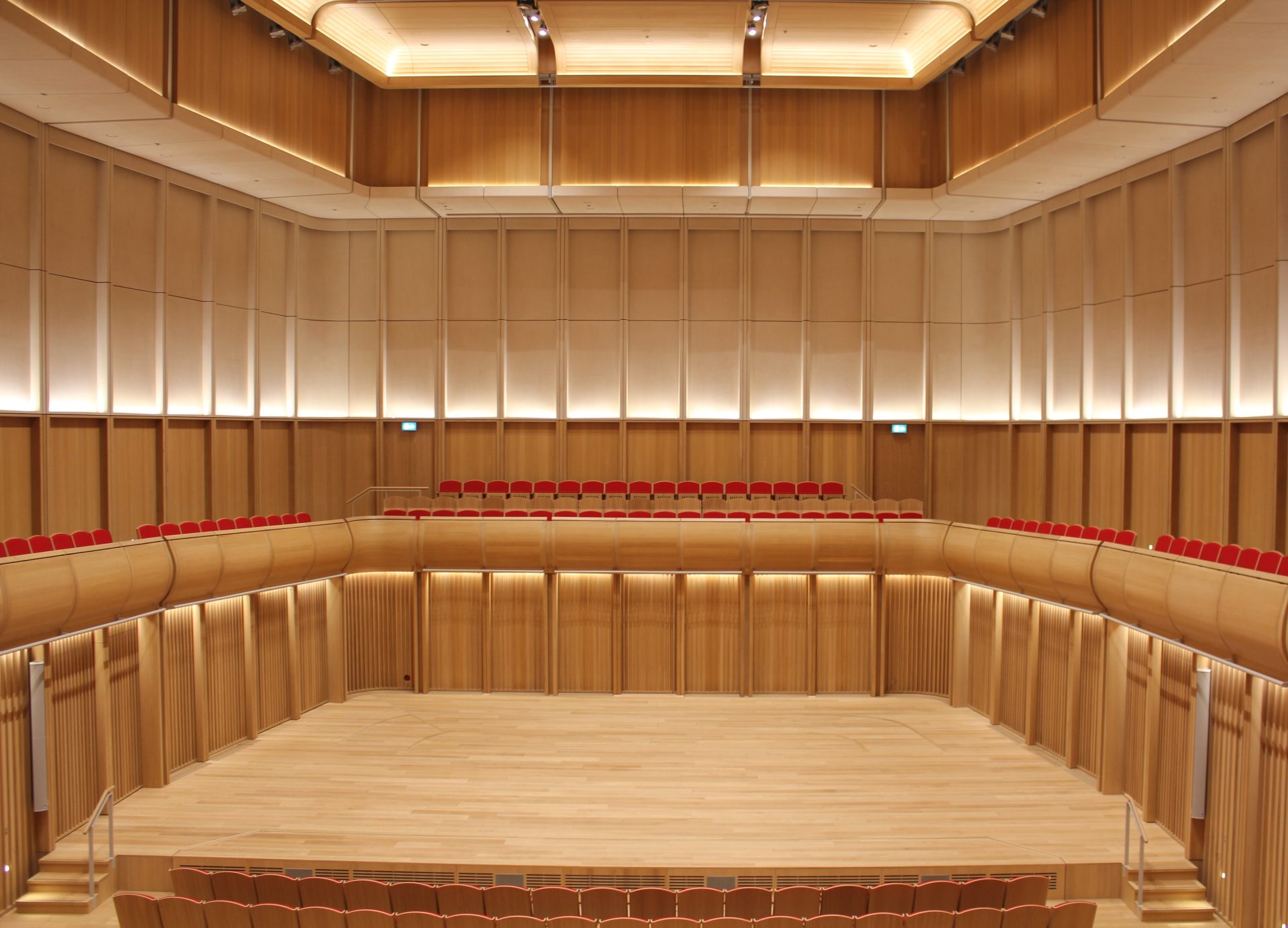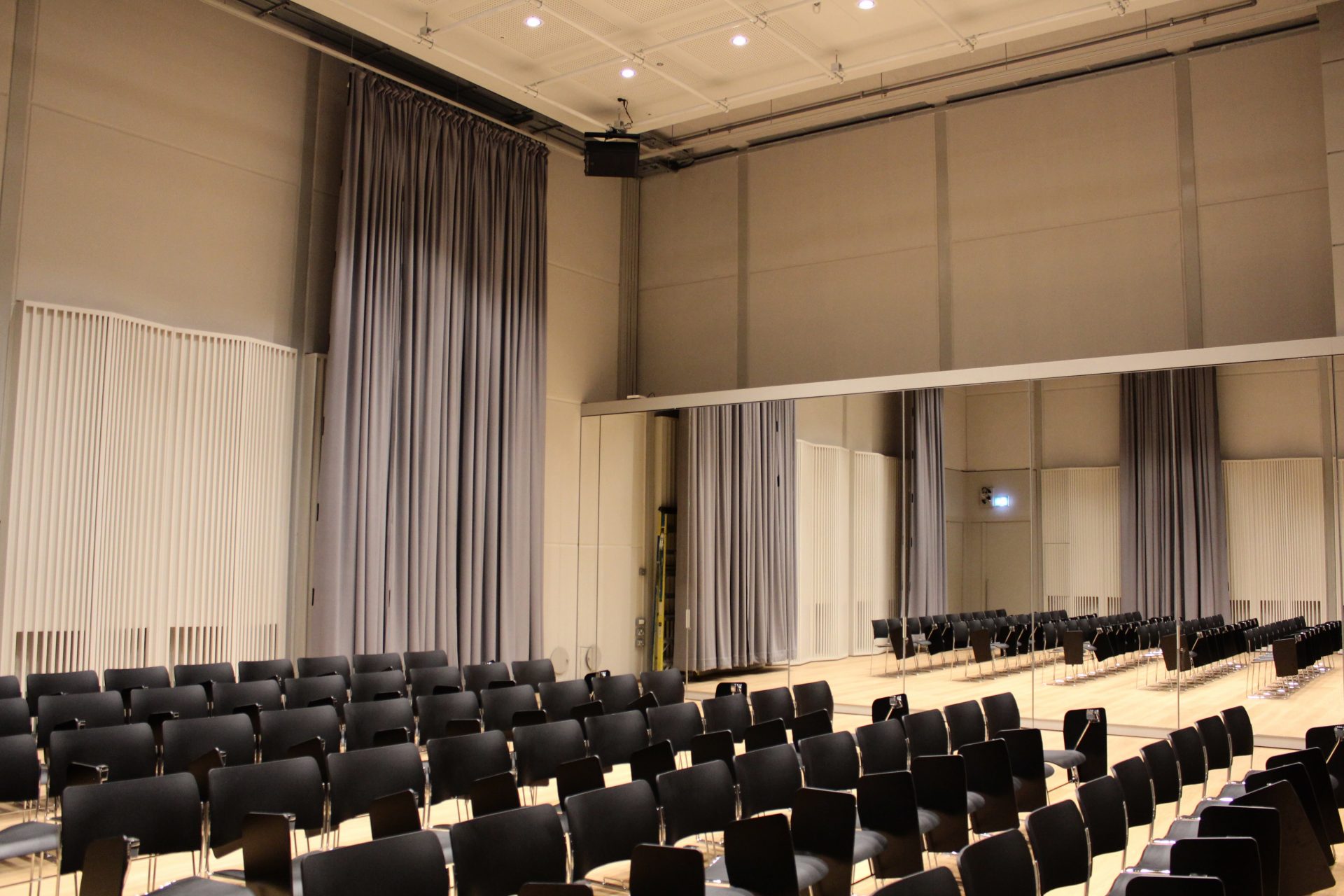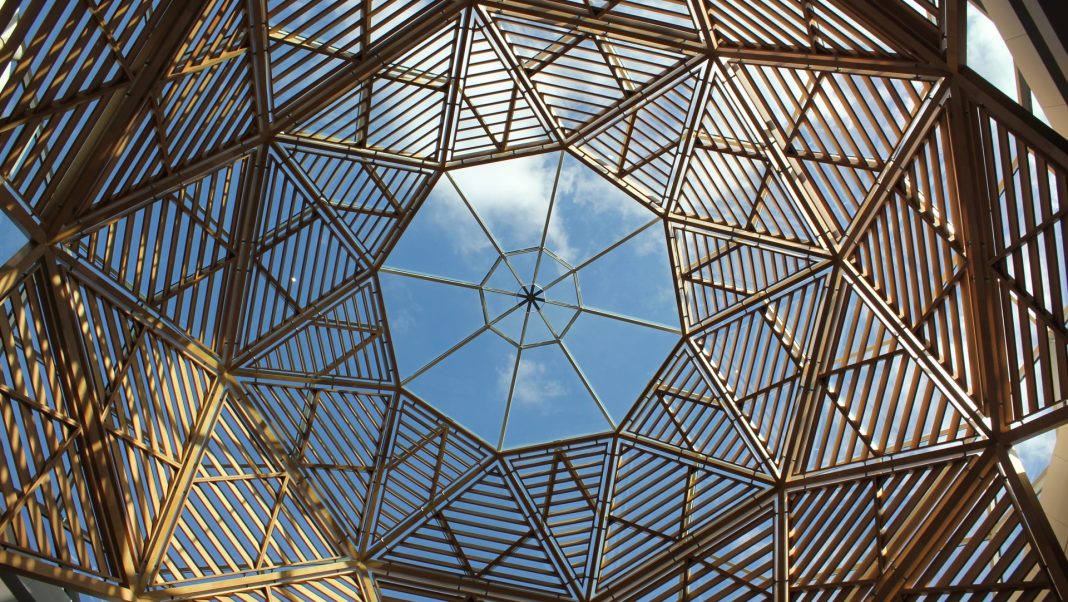The Schwarzman Centre for the Humanities has opened in Oxford’s Radcliffe Observatory Quarter. The Centre is named after Stephen A. Schwarzman, who made donations totalling £185 million, including a £150 million gift which the University described as its biggest “since the Renaissance”.
The new building houses seven faculties: English, History, Linguistics, Philology & Phonetics, Medieval & Modern Languages, Music, Philosophy, and Theology & Religion. It is also home to both the Oxford Internet Institute and the Institute for Ethics in AI. Each faculty has its own dedicated area of the building, including informal social space, a kitchenette, and seminar rooms.
Alongside faculty areas, the five floors of the Schwarzman Centre include the 500-seat Sohmen Concert Hall, a 250-seat theatre for lectures and drama, and an 87-seat cinema and lecture theatre. The Centre will also house a black box performing space, a recital hall, a white box art exhibition space, and a museum for the Bate Collection of historic musical instruments. The ground floor of the Centre is open to the public. This includes a cafe and the Great Hall, a space designed to echo the Radcliffe Camera.
The concert hall, black box theatre, and recital hall are located in the basement, which spans two floors and also features a coffee bar. The substantial underground development was used to maximise space in light of planning regulations which restricted the height of the building. The performance spaces will only open from April 2026, when a new Cultural Program which “aims to welcome audiences and communities into the heart of the research process at Oxford University through public engagement” will also begin.
Vice-Chancellor Irene Tracey said of the Centre: “Its state-of-the-art facilities, reaching out deep into the international cultural community, enables us all to come together in a new dialogue in one extraordinary building befitting of this great and historic University and City.”

The main work space for students is the Bodleian Humanities Library, which opened on 29th September. At 2,100m², it has the combined space of the libraries it will replace, housing the collections from the since-closed Philosophy and Theology, English, and Music Faculty Libraries, as well as smaller collections from the History of Medicine Library and the Oxford Internet Institute Library.
From 2nd October, the Humanities Library will be open to members of the Humanities Division from 9am to 9pm every day. Non-humanities students will have access from 9am to 8pm on weekdays. These are significantly longer hours than most libraries in Oxford, reflecting a desire amongst postgraduates for opening hours that are the same as term-time weekdays.
In total, there are 410 seats in the Humanities library. The majority are in quiet study spaces, but there are also more informal areas as well as flexible study/meeting spaces, which reflect recommendations from the Bodleian Libraries’ recently published study, “The 21st Century Library”.
Of those, 80 seats, located on the inner rim of the upper floors overlooking the atrium, will be restricted to postgraduates. Cherwell understands that it has been a strategic objective of the Humanities Division to provide improved facilities for postgraduate students, given the large increase in numbers over the last two decades. The number seats in the libraries which the this library has replaced totalled 340, meaning there has been an increase of 70 seats overall, but a loss of 10 unrestricted seats.

The Centre was designed by British architecture firm Hopkins Architects, who have previously partnered with Emmanuel College, Cambridge and Nottingham University. It was built according to Passivhaus principles, which aim to maximise energy efficiency, with strong insulation, solar power generation, and planting aimed to increase biodiversity. 97% of the materials used in the building were sourced from within the UK, and the centre hopes to obtain official Passivhaus recognition by the end of the year.
The spaces once occupied by these libraries are now being reallocated for future administrative and academic use. Two leased properties have been handed back to landlords, with the University determining no ongoing need to retain them.
The 250-seat theatre had been due to feature student productions from Hilary Term 2026, but the first slot has since been delayed until Michaelmas 2026. The Schwarzman Centre’s venue booking request form for general use currently states that “rooms are only available from January 2026.” Music practice rooms will be bookable for music students.
As a part of the public Cultural Program, the Schwarzman Centre has appointed ten Cultural Fellows, including artists, musicians, and choreographers, who will exhibit works and run masterclasses in the Centre. The Cultural Programme includes new theatre and dance performances, a series of conversations led by Samira Ahmed on contemporary issues, and a new immersive 360-degree spatial audio experience developed by Icelandic band Sigur Rós.

Stephen Schwarzman, an American billionaire, is the founder, chairman, and chief executive of Blackstone, an investment firm best known for its private equity business. He had previously donated $350 million to the Massachusetts Institute of Technology (MIT) for artificial intelligence research, as well as $100 million to Tsinghua University, Beijing, to build an international scholarship programme inspired by Oxford’s Rhodes Scholarship.
At the time of the donation, Blackstone had recently been singled out by a UN report for its contribution to the global housing crisis. An open letter signed by 27 Oxford academics opposed the University’s decision to accept Schwarzman’s philanthropy, stating that the Schwarzman centre “will be built with the proceeds of the exploitation and disenfranchisement of vulnerable people across the world”. The letter added that: “It is through association with universities like MIT, Yale, and now Oxford, that Schwarzman seeks to legitimise these practices.”
Schwarzman is a committed Republican who has given significant amounts in political donations. In the 2020 election cycle he donated $33.5 million to groups supporting Republicans. In 2024 he announced his intention to donate to Donald Trump’s presidential campaign, and has since supported the President’s introduction of tariffs. He was also recently criticised for having had large amounts of water delivered to his 2500-acre estate in Wiltshire, despite a county-wide hosepipe ban having been in place.
A University spokesperson told Cherwell: “Oxford University has robust and rigorous guidelines regarding the acceptance of donations and research funding … All significant new funders or new gifts or grants from existing funders are reviewed by the Committee to Review Donations and Research Funding (CRDRF) … Those donating money or sponsoring programmes at the University have no influence over how academics carry out their research or what conclusions they reach.”
The Schwarzman Centre’s website states: “The Committee [to Review Donations and Research Funding] reviews all the publicly available information about a potential donor and can take legal, ethical and reputational issues into consideration … Auditors have looked at our process and found it to be robust and effective, and we are confident in its ability to determine which sources of funding are acceptable under our guidelines.”
A spokesperson for Blackstone told Cherwell: “When approached by Oxford, Mr Schwarzman was proud to support the creation of the new Centre – a major unmet need for the university that will benefit students, faculty and the community for years to come.”
On Blackstone’s housing record, they added: “There has been significant inaccurate reporting on this issue. Blackstone is proud to be part of the solution to the global undersupply of the rental housing sector. In the UK, we created Sage Homes, England’s largest provider of newly built affordable housing for the past four years running, committing approximately £4 billion to deliver over 20,000 new affordable homes.”
Regarding Schwarzman’s Wiltshire estate, they said: “There is nothing unlawful about the Estate’s use of water in any way, shape or form. Since purchasing the Estate in 2022, Mr. Schwarzman has been committed to the restoration and preservation of a landmark estate of national heritage and importance. Every aspect of the project is advancing with the highest regard to the law and local regulations.”
Correction: This article previously claimed that music practice rooms in the centre would not be avalible until Hilary Term, and that the old Music Faculty would remain open. In fact, the practice rooms will be bookable from the start of Michaelmas, and the old Faculty building will not be open.


